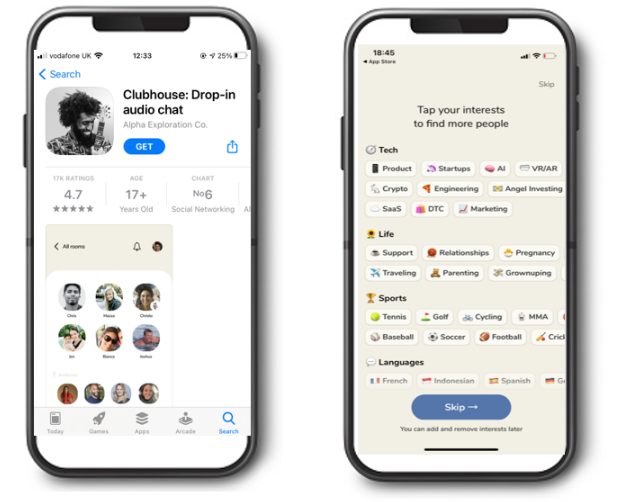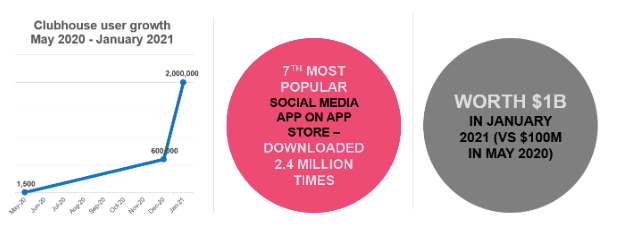Clubhouse: The New Hot Club Everyone Wants To Get In
By: Alkisti Psylou: Media Business Director, Mindshare UK
Clubhouse is the hottest new club of 2021 and has taken the world by storm! And before you start thinking of crowded dance floors, long bar queues and COVID19 restrictions… Clubhouse is not a physical club, but a social networking app solely based on audio.

What is Clubhouse?
So let’s start with the basics, What is Clubhouse? Clubhouse is a new social networking app solely based on audio where users can move around virtual rooms discussing various topics from music, film, culture, beauty, to tech and even… space economy in real time.
Think of it like tuning in a late-night radio show, or a live podcast, giving comments on the topic in real time and participating in the conversation.
You can also create private rooms to catch up with friends or pretend you’re at a house party on a (pre-COVID19) Saturday night without the fear of your conversations being recorded and posted on other social platforms as recording on Clubhouse is strictly forbidden.
Who is on it?
The app was launched in BETA in March 2020 and has gained lots of popularity in a short time. Celebrities, influencers and famous entrepreneurs, the likes of Oprah, Elon Musk, Vergil Abloh and Drake, have already joined Clubhouse and started occasionally appearing in various chat rooms.
How to get in?
So the big questions is – how to get in? Currently you have to receive an invite from another member to access the platform but as the app continues to expand globally, it is expected to open its doors to a wider audience very soon.
How popular is Clubhouse?
The Clubhouse App has experienced explosive growth over the past 2 months.
The platform started with only 1,500 users in May 2020, growing to 600,000 users in December 2020 and currently reported 2M weekly active users.

Clubhouse is currently the 7th most popular app in the “Social Media Network” category of the App Store, behind Facebook, Messenger, and WhatsApp, and has been downloaded 2.4 million times.
This accelerated growth, has had a positive impact on the app’s valuation which is currently worth $1B and is backed by US venture capitalists Marc Andreessen and Ben Horowitz. To put that in perspective, Clubhouse’s valuation in May 2020, was $100 million.
Facebook is allegedly already seeing Clubhouse as a threat… According to New York Times, the social media giant is already working on creating a Clubhouse clone which is in its early stages of development.
Twitter is also another rival that is catching up and is currently testing Clubhouse-like voice chat rooms called Spaces.
However, while it might come as no surprise to many, Clubhouse hasn’t been able to get through China’s Great Firewall. The app was banned last week after users in mainland China joined Clubhouse and started having open conversations on sensitive topics like the Hong Kong protests, and other human rights issues that are out of bounds in China’s censored Internet environment.
Opportunities and considerations for brands
Although it’s still early days, what appears to be really unique about Clubhouse is that it offers an element of authenticity and unfiltered human interaction which allows for deep engagement, conversation and even intimacy, giving people an opportunity to have a voice.
These characteristics will start making the platform attractive to brands as it offers them the opportunity to create meaningful engagement with their customers through genuine conversations.
However, there are a few considerations brands and marketers need to be mindful of before deciding to be present on Clubhouse.
- Consideration #1: Brands need to focus on topics that their customers care about and not on products:
For example, organic beauty brands like Weleda and Kora Organics could get influencers together and have weekly conversations about the source of skincare ingredients, and the real meaning of natural beauty.
Omega can start a conversation about the 2021 Olympic Games drawing on the historic ethos of the games to promote unity and global harmony and brands like Balenciaga or Gucci can lead conversations about various sub-cultures and the authentic meaning of luxury.
2. Consideration #2: Brands who engage on the platform will have to put their purpose first but also be authentic and inclusive.
While Clubhouse is still in its infancy, I consider this as a positive development in the social media sphere, fostering open conversations and a new window for brands to build intimate communication with customers.





